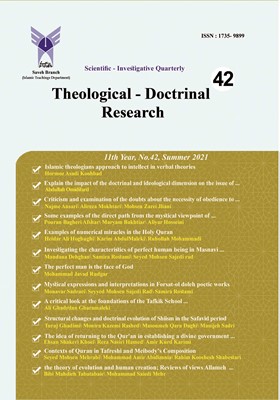-
-
List of Articles
-
Open Access Article
1 - Islamic theologians approach to intellect in verbal theories
hormoz asadikohbad -
Open Access Article
2 - Explain the impact of the doctrinal and ideological dimension on the issue of Muslim-non-Muslim marriage
Abdullah Omidifard -
Open Access Article
3 - Criticism and examination of the doubts about the necessity of obedience to the Holy Prophet (PBUH)
najmeh ansari alireza mokhtari mohsen zarei jalyani -
Open Access Article
4 - Some examples of the direct path from the mystical viewpoint of Imam Khomeini (RA)
Pouran Bagheri Afshar Maryam Bakhtiar Aliyar Hosseini -
Open Access Article
5 - Examples of numerical miracles in the Holy Quran
Heidar Ali Hoghughi Karim AbdulMaleki Ruhollah Mohammadi -
Open Access Article
6 - Investigating the characteristics of perfect human being in Masnavi Asrar al-shuhood of Asiri Lahiji
Mandana , Dehghan, samera rostami seyed mohsen sajedirad -
Open Access Article
7 - The perfect man is the face of God
Mohammad Javad Rudgar -
Open Access Article
8 - Mystical expressions and interpretations in Forsat-ol doleh poetic works
monavar sadraei seyed mohsen sajedirad samera rostami -
Open Access Article
9 - A critical look at the foundations of the Tafkik School (centered on Sheikh Mojtaba's Qazvini)
Ali Ghadrdan Gharamaleki -
Open Access Article
10 - Structural changes and doctrinal evolution of Shiism in the Safavid period
toraj kadimi moneri kazemi rashd Masoumeh Qara Daghi manegei sadri -
Open Access Article
11 - The idea of returning to the Qur'an in establishing a divine government (Focusing on the views of Martyr Motahhari and Imam Khomeini)
ehsan shakeri khoei reza nasiri hamed amir kordkarimi -
Open Access Article
12 - Contexts of Quran in Tafreshi and Meibodyʼs Composition
seyed Mohsen Mehrabi Mohammad Amir Obeidi Nia Rahim Koushesh Shabestari -
Open Access Article
13 - the theory of evolution and human creation; Reviews of views Allameh Tabatabei and Yadollah Sahabi
mahdiye tabatabae Mohammad Saeedi Mehr
-
The rights to this website are owned by the Raimag Press Management System.
Copyright © 2017-2026







